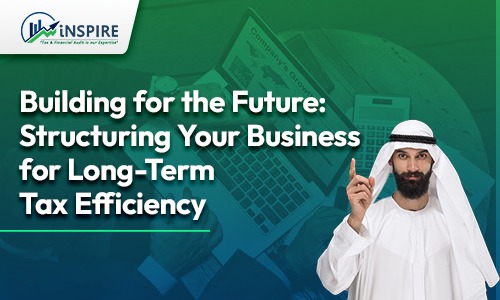
Building for the Future: Structuring Your Business for Long-Term Tax Efficiency
The seeds of a successful business are sown not just with a great idea, but also with a well-planned structure. While passion and hard work are essential, understanding your business's legal and tax framework is crucial for long-term financial health. Tax efficiency paves the way for sustained growth, allowing you to reinvest profits and fuel your company's future. This blog explores how to structure your business for long-term tax efficiency, ensuring you navigate the complexities of taxes while maximizing your financial potential.
Optimizing Your Business Structure for Tax Advantages
Choosing the right business entity is the first step towards tax efficiency. However, a well-structured business goes beyond the initial setup. Here's how to optimize your structure for long-term tax benefits:
Understanding Ownership Structure: Define ownership roles clearly, especially when dealing with multiple partners or shareholders. This ensures a clear understanding of profit and loss distribution, which can impact your tax liabilities.
Strategic Use of Business Expenses: Maximize tax deductions by maintaining detailed records of all legitimate business expenses, including office supplies, travel costs, and marketing campaigns.
Employee Benefits and Compensation Strategies: Offering employee benefits like health insurance and retirement plans can not only attract top talent but also be tax-deductible for your business. Consider exploring tax-advantaged employee compensation strategies, potentially lowering your overall tax burden.
Entity Conversions for Future Needs: Your business needs may evolve over time. Be aware of the flexibility your chosen entity offers in terms of conversion to another structure if your future goals necessitate a change.
Staying Informed of Tax Law Changes: Tax laws are subject to revisions. Partner with a tax advisor who can keep you updated on relevant changes and ensure your business structure remains tax-efficient in the face of evolving regulations.
Building a Sustainable Tax Strategy:
Long-term tax efficiency requires a proactive and collaborative approach:
Develop a Long-Term Vision: Clearly define your business goals for the next few years. This helps your tax advisor recommend strategies that align with your growth aspirations and optimize your tax efficiency throughout your growth journey.
Regular Reviews and Adjustments: Schedule periodic reviews of your business structure with your tax advisor. These reviews ensure your setup remains efficient as your business grows and your financial landscape changes.
Tax Planning for Growth Milestones: Reaching key milestones like hiring additional employees, expanding to new markets, or acquiring another business presents potential tax implications. Proactive planning around these milestones reduces the risk of unexpected tax burdens and ensures a smooth transition.
Building a strong foundation for your business starts with structuring it for long-term tax efficiency. By understanding tax implications, optimizing your entity setup, and partnering with a tax advisor for a long-term strategy, you can maximize your financial potential and position your business for sustained success. Remember, tax efficiency is a journey, not a destination. By actively managing your business structure and adapting to changing regulations, you can navigate the tax landscape with confidence and unlock the full potential of your entrepreneurial vision.











